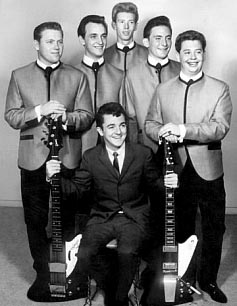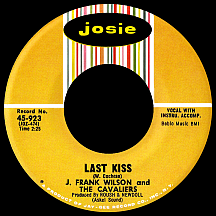J. FRANK WILSON
AND THE CAVALIERS
Last Kiss
"Last Kiss" was a late entry in a long line of "teenage death" songs, a car crash tragedy similar in tone to "Teen Angel" by Mark Dinning and "Tell Laura I Love Her" by Ray Peterson, two of the top-selling singles of 1960. Wayne Cochran had been making records since 1959; his first single was a self-penned rocker called "My Little Girl" on the short-lived Scottie label. Two years later he composed his own audio ode to a fatal auto accident, reportedly based on a real incident that took the lives of two teenagers near his rural Georgia home. The lyrics of "Last Kiss" are a bit graphic (...the cryin' tires, the bustin' glass...the painful scream that I heard last') and heartbreaking, suggesting one ill-fated lover had survived to mourn his dear departed ('Well, where oh where can my baby be? The Lord took her away from me...'). Issued on a small Georgia label, Gala, the record failed to catch on, in spite of the prevailing trend.
Cochran ventured forth undeterred; a no-punches-pulled performer, he wore a prominent silvery pompadour and based his energetic stage routines on the dance moves of the best in the biz, James Brown. With his band The C.C. Riders, Wayne played one gig after another, mainly in the south; throughout the '60s and '70s he recorded for several small labels and at least two big ones, King and Mercury, having limited success, mainly in the Miami area, in 1966 and '67. The "death song" movement and its highway catastrophe subgenre was still going strong in '64 with Jan and Dean's "Dead Man's Curve" and The Shangri-Las' "Leader of the Pack." The apparently unwearying fascination people had with the subject resulted in yet another top-selling death disc that year, giving Wayne the hit he'd sought three years earlier...but as a songwriter, not a singer.
The Cavaliers of San Angelo, Texas had been together since the mid-'50s. Lead guitarist Sid Holmes, saxophonist Bob Zeller, bassist Lewis Elliott, drummer Ray Smith and lead singer Alton Baird (who left the band within the first few years) hadn't progressed very far beyond playing regional clubs. John Frank Wilson, a native of the east Texas town of Lufkin, had been obssessed with rockers like Elvis Presley and Buddy Holly as a teenager; after graduating from high school in 1960 he served two years in the Air Force and joined the Cavaliers, who'd gone through a few lead singers without much luck. While playing a small middle-Texas town, the group was spotted by Sonley Roush, a local music manager with connections at a studio in San Angelo run by Ron Newdoll. Most of the original band members had left by this time; the '64 lineup included guitarist Gene "Buddy" Croyle and drummer Roland "Snake" Atkinson. "Last Kiss" was recorded and pressed on the Tamara label and received airplay in a few, mostly eastern, U.S. cities in the summer of 1964.

Major Bill Smith (who'd previously discovered and produced two chart-topping acts, Bruce Channel and Paul and Paula), stepped in, made claims about a contract he had with Roush, wound up owning the property, and made arrangements for a different, slightly softer, take of the song from the same session to be released nationally on the larger Josie label of New York. Josie's owners hedged their bets by putting out two singles, "Last Kiss" by J. Frank Wilson and the Cavaliers and "Summertime," credited to The Cavaliers (though it also features J. Frank's vocals). "Last Kiss" started moving up the national charts in early September. Several weeks later, just after the song made it into the top ten, life tragically imitated art. While driving in Ohio en route to a scheduled show, an auto accident claimed Roush's life and left Wilson injured with his leg in a cast. He resumed after a short rest, appearing on crutches during stage shows and TV series like American Bandstand. The single went on to hit number one on the Cash Box charts and number two on Billboard the first week in November.
J. Frank and the Cavaliers tackled "Hey Little One" (a great Dorsey Burnette hit from 1960), which has a strong vocal and raw sax work that sets it apart from all other versions, but it managed only a brief appearance on the charts near the end of '64. "Six Boys" was credited to Wilson alone and tells a tale of a half dozen guys mourning yet another dead girl. When asked about all this depressing material, he replied, "They won't let me do a happy song since 'Last Kiss' went so big." Two more singles ("Dreams of a Fool" and an update of the Marty Robbins hit "A White Sport Coat and a Pink Carnation") and he was dropped by Josie...less than a year after his million-selling hit. He continued performing, mostly for small crowds, and made occasional records for regional labels.
In 1973, Canadian pop group Wednesday of Oshawa, Ontario remade "Last Kiss," taking it to the top 40 in the U.S. in early '74; Wilson's version also hit the charts on reissue label Virgo, creating new demand for the 32-year-old singer, whose struggles with alcohol had largely sidelined his career. He began performing again and took another stab at recording with "Tell Laura I Love Her," the Ray Peterson death-by-racecar hit that had predated his own similarly-disposed smash. His voice was still in fine form, but the single went nowhere. In 1991, after years of heavy drinking, several marriages and a number of low-paying, non-music-related jobs, Wilson died at age 49. Wayne Cochran, the song's composer, ultimately benefited most from "Last Kiss," a major seller by three artists, most recently Seattle rockers Pearl Jam, whose 1999 remake matched J. Frank Wilson and the Cavaliers' number two Billboard peak.


